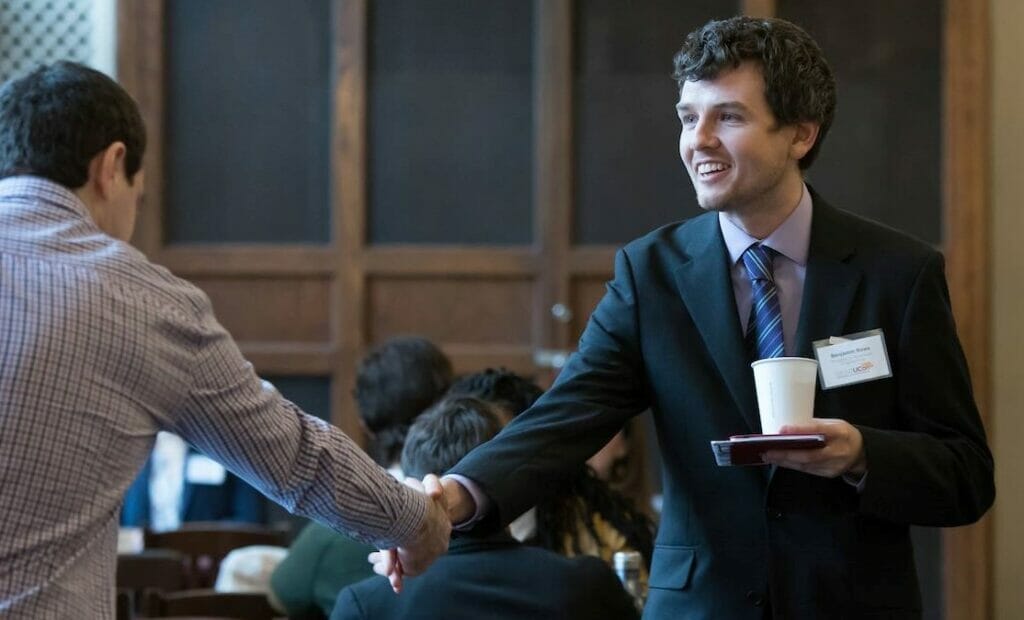Interviewing Basics
After working hard on your job application materials, you are pleased to receive an invitation for an interview. What do you do next? A great first step is scheduling a mock interview or strategy session with your UChicagoGRAD career advisor. These advisors can help you communicate with confidence, whether you are conducting a first-round interview via Zoom or delivering a job talk in person.
No matter the format of your interview, keep in mind that it is not just a chance to highlight your experiences, accomplishments, and skills. An interview is also an opportunity to show off your personality, communication skills, and enthusiasm for the position.

Preparing for First-Round Interviews
Many employers conduct two rounds of interviews before extending a job offer. The first round is sometimes called a “screening interview” and might occur over the phone or an online video platform like Zoom. First-round interviews can vary considerably, so it is important to be prepared for multiple possibilities. Typically, first-round interviews last between 20-45 minutes and focus on big-picture questions that ask you to introduce yourself, highlight key skills and experiences, and discuss why you are interested in the position. Common first-round interview questions include:
- Tell me about yourself.
- Why are you interested in this position?
- Why are you interested in this organization?
- What are your strengths? What are your weaknesses?
- What do you think makes you a good fit for this position?
In a first-round interview, it is important to show familiarity with the job description and the employer’s mission. Directly connect your experiences with your ability to succeed in the prospective job and achieve the organization’s goals.
At the end of an interview, the interviewer usually asks if you have questions for them. You should prepare at least three questions for your interviewer. Good questions show your curiosity about the position, the organization, and the workplace environment.
Preparing for Second-Round Interviews
Second-round interviews are often more in-depth. An employer might schedule several meetings with different people in the organization. You might have separate interviews with a human resources manager, your potential supervisor, and the director of your division. In other cases, you might interview with a panel of potential colleagues. Sometimes, in-person interviews are also combined with a group meal with members of your team.
In a second-round interview, remember that you are interviewing from the moment you walk in the door or open your video platform. Be courteous and cheerful with everyone you meet, from the office assistant to the CEO.
Second-round interviews usually delve deeper into the experiences and skills described in your résumé and cover letter. Be ready for the same general questions that are typical of a first-round interview. But, you should also be ready to go into more detail about your past experiences, highlighting your skills and strengths with specific examples. Depending on the position, you may also be invited to give a presentation or participate in another exercise that demonstrates your ability to do the job.
Interview Etiquette
Attire. Generally, it is appropriate to wear business attire unless the employer specifically tells you that you can dress casually. This is true for both online video interviews and in-person interviews. Business attire can range from mix-and match pants/skirt/blazer combos to formal business suits. If you are interviewing for a position in which employees are expected to wear formal business suits on a daily basis, that is what you should wear to the interview. For less formal job environments, a mix-and-match approach might work just as well. It is usually safer and more common to be overdressed (rather than underdressed) for an interview.
What to Bring. Always bring a notepad and copies of your résumé to any in-person interview. You do not need to give your résumé to the interviewer at the beginning of the interview, but it is always good to be prepared. For in-person interviews that last for many hours, you may want to bring water or a snack for a quick energy boost.
Following Up. After any interview, you should send a thank-you email to your interviewer or interviewers, ideally the first business day after your interview. This email should be a relatively short, one-paragraph message in which you thank the interviewer for their time, describe something specific you enjoyed about the interview, and express your continued interest in the position. If you are unable to find the email addresses of your interviewers, then you can send the thank you email to the office manager or recruiter who scheduled the interview, asking them to pass along your message.